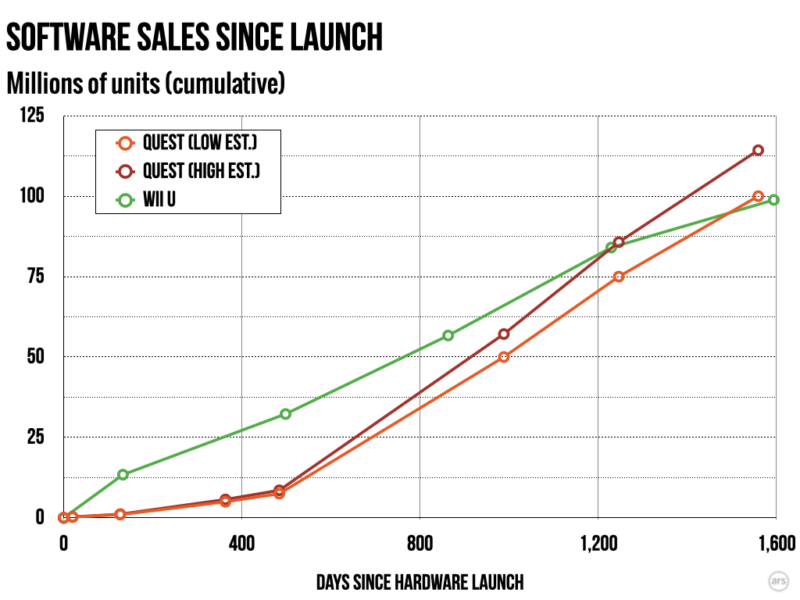
During Wednesday's Meta Connect keynote presentation, the company announced a new milestone for its line of standalone Quest headsets: $2 billion in lifetime revenue from Quest apps and software since the platform launched back in 2019. On first glance, that's a pretty big number that suggests the formation of a pretty healthy VR software ecosystem.
But looked at in context, Ars' analysis suggests the Quest software market is roughly the same size as that for the Wii U at a similar point in its short life cycle. That's not a great comparison for Meta to be facing, since the Wii U was rightly considered an embarrassing flop by the standards of the video game market.
Even accounting for those adjustments, though, the software markets for the Wii U and Quest (at similar points in their life cycles) would seem to be in similar neighborhoods. The Wii U's sales of nearly 99 million software units in its first 1,594 days on the market is just behind the roughly 100 to 114 million pieces of Quest software Meta has sold in 1,559 days, according to Ars' estimates.
To be fair to the Quest, software sales for the headset have shown a distinct upward trajectory since the launch of the Quest 2 in October 2020. If you disregard the 16 months of Quest 1 software sales that preceded the Quest 2 launch, the headset has been selling software at a significantly faster rate than the Wii U. Meta also deserves credit for building the Quest's software library from what was essentially a standing start into a robust storefront with over 500 apps. Comparing a new VR platform to a Nintendo console that could lean on ultra-popular first-party franchises developed over decades isn't completely fair to the newcomer.
At the same time, many of the Wii U's most popular first-party games consistently sold for $59.99, with exceedingly rare official discounts. That means Nintendo's console likely generated much more overall software revenue than the cheaper software on the Quest. The Wii U was also selling its software to just 13.57 million Wii U owners (as of March 2017), compared to reports of over 20 million Quest headset sales so far. This suggests that the average Quest owner is spending a lot less on software than the average Wii U owner did.
But Quest's overall revenues will have to get a lot healthier to justify the massive investment Meta has made in the hardware line. The company's Reality Labs division has lost $21 billion since the beginning of 2022, over and beyond the $2 billion it spent on the company then known as Oculus in 2014. Quest software and hardware would have to start selling orders of magnitude better than the Wii U to make up for that kind of continuing investment in the technology.
Back in the late 2010s, you could argue that VR headsets were an immature and risky new concept that might take a while to catch on with the masses. Now, in late 2023, the market has had enough time to reach something approaching its full potential. That this potential currently seems to mirror one of the worst-received game consoles of the modern era should be deeply concerning to Meta and those with high hopes for virtual reality in general.
SOURCE
Kind of a shame VR is doing so badly across the board. I wonder if Quest 3 or Apple's set can change things.





